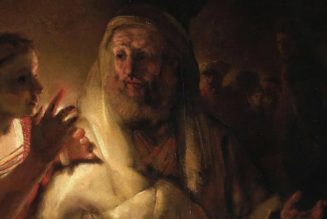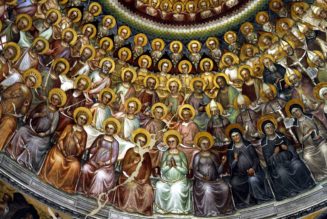Thankfulness to God who offers friendship is the sine qua non of eucharistic living. Thankfulness for and attention to our old friends make us open to new friends whom God will place in our lives. In that way, our friendships here prepare us for heaven.
Victor Lee Austin, Friendship: The Heart of Being Human (173 pages, Baker Academic, 2020)
 Fr. Servais Pinckaers, O.P. (1925-2008) was a Swiss theologian who worked to return Catholic moral theology to the orientation of the Patristic and Medieval greats. He argued that after the fourteenth-century thinker William of Ockham’s changes to the traditional understanding of the human will, almost all moral thinkers—Catholic, Protestant, rigorist, laxist, or whatever—boiled the moral life down simply to a question of obligations. The Fathers and St. Thomas, by contrast, treated moral theology in a broader fashion as about happiness, virtues, and life in the Spirit.
Fr. Servais Pinckaers, O.P. (1925-2008) was a Swiss theologian who worked to return Catholic moral theology to the orientation of the Patristic and Medieval greats. He argued that after the fourteenth-century thinker William of Ockham’s changes to the traditional understanding of the human will, almost all moral thinkers—Catholic, Protestant, rigorist, laxist, or whatever—boiled the moral life down simply to a question of obligations. The Fathers and St. Thomas, by contrast, treated moral theology in a broader fashion as about happiness, virtues, and life in the Spirit.
Don’t misunderstand. Morality certainly has to do with fulfilling absolute obligations. But the problem with thinking only in terms of obligations is that when there is no absolute command to do or not do something, many people think that there is no moral component to our behavior. Yet to live a fully Christian life is to think of all of one’s life as about God’s will, even (or perhaps especially) when the decisions involve not one right or wrong answer but instead a lot of gray ones. Even when there is no specific moral obligation at hand, we still have the larger obligation to seek the good and happiness in Jesus.
Thinking about our moral life solely in terms of obligations and commandments, positive and negative, leaves out a lot of things that go toward making us happy. Fr. Pinckaers showed that many modern moral theology treatises looked only at biblical passages with explicit moral commandments, whereas the Fathers and Doctors saw a moral sense in all scripture. In terms of the subjects treated, there were a great many topics missing. Friendship is one of them, because it is not ultimately about obligations. You might be obligated to behave in particular ways toward a friend (that is, with loving actions), but there is no obligation to have a friendship.
Since Fr. Pinckaers’s work, however, there have been a number of treatises on friendship. One of the newer ones was written by a friend of mine, Victor Lee Austin, who is an Episcopal priest and theologian-in-residence in the Episcopal Diocese of Dallas.
 I don’t often recommend a theologian from the Episcopal Church, but when I do, it’s usually Victor. He is a talented writer, who has penned (among other books) a short guide to Christian ethics and a defense of the idea of authority (Up With Authority is his delightful title). My favorite is his 2016 memoir and theological reflection, Losing Susan. That volume told the story of his beautiful marriage and how he spent the last seventeen years of it taking increasing responsibility for the care of his wife, who had developed brain cancer fifteen years into their marriage. The lessons he recounted learning in that book had to do with how marital love could coexist with and even help to grow the love of God. They were also about the strange love of God that both gives and takes away.
I don’t often recommend a theologian from the Episcopal Church, but when I do, it’s usually Victor. He is a talented writer, who has penned (among other books) a short guide to Christian ethics and a defense of the idea of authority (Up With Authority is his delightful title). My favorite is his 2016 memoir and theological reflection, Losing Susan. That volume told the story of his beautiful marriage and how he spent the last seventeen years of it taking increasing responsibility for the care of his wife, who had developed brain cancer fifteen years into their marriage. The lessons he recounted learning in that book had to do with how marital love could coexist with and even help to grow the love of God. They were also about the strange love of God that both gives and takes away.
His next book, Friendship: The Heart of Being Human, is a natural sequel to the first. While many people wondered about the widower’s romantic life, nobody asked about his friendships. There is something revealing about that: most people, even serious Christians, often assume that what is necessary for us is the relationship of marriage, or at least the sexual part. That isn’t true. “One must have friends in order to be fully human. One need not marry or otherwise have sexual intercourse in order to be fully human.”
That quotation is from his chapter titled “Unapologetic Celibacy,” which explains how he has come to think the teaching (expressed by both St. Paul and the Council of Trent) that celibacy is an even higher good than marriage is “not as bone-headed as I once thought it was.”
What helped him in that realization (which many Catholics as well as non-Catholics think bone-headed) is reflection on a number of biblical passages that do not have commandments in them but are moral nonetheless. One was Jesus’ revelation that in heaven “they will neither marry nor be given in marriage” (Matthew 22:30). Others include passages about what God is calling us to: friendship with him for eternity. Together they point to an insight that was suggested to him by the late Dominican theologian Fr. Herbert McCabe: “heaven is people living together as friends—friends with each other, friends with God.”
If marriage’s exclusivity points us to the heavenly kingdom as an icon of the relationship of Christ and the Church, friendship points us to how we will relate to God and each other at the everlasting marriage banquet of the Lamb. Jesus’ friendship is both personal and expansive in a way that the particular kind of friendship of marriage cannot and must not be. And Jesus’ friendship with us is itself rooted in the Trinity, which, as St. Augustine said, “may fitly be called friendship.”
What makes Friendship, like all Victor’s books, delightful is that his theological reflection is both plainly and familiarly expressed with attention to the ancients, our everyday life, and modern culture. Aristotle shows us how “weird” God’s offer of friendship is, for the philosopher argued that true friendship can only be between equals. Modern life and entertainment show us the deep craving for friendship that can be met only ultimately by God’s friendship.
Best are the practical, moral suggestions along the way and in a concluding postscript about the practice of friendship with each other and God. The thankfulness at the heart of Christian life grounds this advice. Thankfulness to God who offers friendship is the sine qua non of eucharistic living. Thankfulness for and attention to our old friends make us open to new friends whom God will place in our lives. In that way, our friendships here prepare us for heaven. There we will share with God and each other an intimacy more expansive and even deeper than that of earthly marriage.
Republished with gracious permission from The Catholic Servant.
The Imaginative Conservative applies the principle of appreciation to the discussion of culture and politics—we approach dialogue with magnanimity rather than with mere civility. Will you help us remain a refreshing oasis in the increasingly contentious arena of modern discourse? Please consider donating now.
The featured image is “Amistad” (1896) by Jef Leempoels, and is in the public domain, courtesy of Wikimedia Commons.
Share This Story, Choose Your Platform!
body{–wp–preset–color–black: #000000;–wp–preset–color–cyan-bluish-gray: #abb8c3;–wp–preset–color–white: #ffffff;–wp–preset–color–pale-pink: #f78da7;–wp–preset–color–vivid-red: #cf2e2e;–wp–preset–color–luminous-vivid-orange: #ff6900;–wp–preset–color–luminous-vivid-amber: #fcb900;–wp–preset–color–light-green-cyan: #7bdcb5;–wp–preset–color–vivid-green-cyan: #00d084;–wp–preset–color–pale-cyan-blue: #8ed1fc;–wp–preset–color–vivid-cyan-blue: #0693e3;–wp–preset–color–vivid-purple: #9b51e0;–wp–preset–color–awb-color-1: rgba(255,255,255,1);–wp–preset–color–awb-color-2: rgba(246,246,246,1);–wp–preset–color–awb-color-3: rgba(224,222,222,1);–wp–preset–color–awb-color-4: rgba(233,168,37,1);–wp–preset–color–awb-color-5: rgba(116,116,116,1);–wp–preset–color–awb-color-6: rgba(120,85,16,1);–wp–preset–color–awb-color-7: rgba(62,62,62,1);–wp–preset–color–awb-color-8: rgba(51,51,51,1);–wp–preset–color–awb-color-custom-10: rgba(174,137,93,1);–wp–preset–color–awb-color-custom-11: rgba(192,153,107,1);–wp–preset–color–awb-color-custom-12: rgba(190,189,189,1);–wp–preset–color–awb-color-custom-13: rgba(62,62,62,0.8);–wp–preset–color–awb-color-custom-14: rgba(68,68,68,1);–wp–preset–color–awb-color-custom-15: rgba(221,221,221,1);–wp–preset–color–awb-color-custom-16: rgba(232,232,232,1);–wp–preset–color–awb-color-custom-17: rgba(249,249,249,1);–wp–preset–color–awb-color-custom-18: rgba(229,229,229,1);–wp–preset–gradient–vivid-cyan-blue-to-vivid-purple: linear-gradient(135deg,rgba(6,147,227,1) 0%,rgb(155,81,224) 100%);–wp–preset–gradient–light-green-cyan-to-vivid-green-cyan: linear-gradient(135deg,rgb(122,220,180) 0%,rgb(0,208,130) 100%);–wp–preset–gradient–luminous-vivid-amber-to-luminous-vivid-orange: linear-gradient(135deg,rgba(252,185,0,1) 0%,rgba(255,105,0,1) 100%);–wp–preset–gradient–luminous-vivid-orange-to-vivid-red: linear-gradient(135deg,rgba(255,105,0,1) 0%,rgb(207,46,46) 100%);–wp–preset–gradient–very-light-gray-to-cyan-bluish-gray: linear-gradient(135deg,rgb(238,238,238) 0%,rgb(169,184,195) 100%);–wp–preset–gradient–cool-to-warm-spectrum: linear-gradient(135deg,rgb(74,234,220) 0%,rgb(151,120,209) 20%,rgb(207,42,186) 40%,rgb(238,44,130) 60%,rgb(251,105,98) 80%,rgb(254,248,76) 100%);–wp–preset–gradient–blush-light-purple: linear-gradient(135deg,rgb(255,206,236) 0%,rgb(152,150,240) 100%);–wp–preset–gradient–blush-bordeaux: linear-gradient(135deg,rgb(254,205,165) 0%,rgb(254,45,45) 50%,rgb(107,0,62) 100%);–wp–preset–gradient–luminous-dusk: linear-gradient(135deg,rgb(255,203,112) 0%,rgb(199,81,192) 50%,rgb(65,88,208) 100%);–wp–preset–gradient–pale-ocean: linear-gradient(135deg,rgb(255,245,203) 0%,rgb(182,227,212) 50%,rgb(51,167,181) 100%);–wp–preset–gradient–electric-grass: linear-gradient(135deg,rgb(202,248,128) 0%,rgb(113,206,126) 100%);–wp–preset–gradient–midnight: linear-gradient(135deg,rgb(2,3,129) 0%,rgb(40,116,252) 100%);–wp–preset–duotone–dark-grayscale: url(‘#wp-duotone-dark-grayscale’);–wp–preset–duotone–grayscale: url(‘#wp-duotone-grayscale’);–wp–preset–duotone–purple-yellow: url(‘#wp-duotone-purple-yellow’);–wp–preset–duotone–blue-red: url(‘#wp-duotone-blue-red’);–wp–preset–duotone–midnight: url(‘#wp-duotone-midnight’);–wp–preset–duotone–magenta-yellow: url(‘#wp-duotone-magenta-yellow’);–wp–preset–duotone–purple-green: url(‘#wp-duotone-purple-green’);–wp–preset–duotone–blue-orange: url(‘#wp-duotone-blue-orange’);–wp–preset–font-size–small: 11.25px;–wp–preset–font-size–medium: 20px;–wp–preset–font-size–large: 22.5px;–wp–preset–font-size–x-large: 42px;–wp–preset–font-size–normal: 15px;–wp–preset–font-size–xlarge: 30px;–wp–preset–font-size–huge: 45px;–wp–preset–spacing–20: 0.44rem;–wp–preset–spacing–30: 0.67rem;–wp–preset–spacing–40: 1rem;–wp–preset–spacing–50: 1.5rem;–wp–preset–spacing–60: 2.25rem;–wp–preset–spacing–70: 3.38rem;–wp–preset–spacing–80: 5.06rem;–wp–preset–shadow–natural: 6px 6px 9px rgba(0, 0, 0, 0.2);–wp–preset–shadow–deep: 12px 12px 50px rgba(0, 0, 0, 0.4);–wp–preset–shadow–sharp: 6px 6px 0px rgba(0, 0, 0, 0.2);–wp–preset–shadow–outlined: 6px 6px 0px -3px rgba(255, 255, 255, 1), 6px 6px rgba(0, 0, 0, 1);–wp–preset–shadow–crisp: 6px 6px 0px rgba(0, 0, 0, 1);}:where(.is-layout-flex){gap: 0.5em;}body .is-layout-flow > .alignleft{float: left;margin-inline-start: 0;margin-inline-end: 2em;}body .is-layout-flow > .alignright{float: right;margin-inline-start: 2em;margin-inline-end: 0;}body .is-layout-flow > .aligncenter{margin-left: auto !important;margin-right: auto !important;}body .is-layout-constrained > .alignleft{float: left;margin-inline-start: 0;margin-inline-end: 2em;}body .is-layout-constrained > .alignright{float: right;margin-inline-start: 2em;margin-inline-end: 0;}body .is-layout-constrained > .aligncenter{margin-left: auto !important;margin-right: auto !important;}body .is-layout-constrained > :where(:not(.alignleft):not(.alignright):not(.alignfull)){max-width: var(–wp–style–global–content-size);margin-left: auto !important;margin-right: auto !important;}body .is-layout-constrained > .alignwide{max-width: var(–wp–style–global–wide-size);}body .is-layout-flex{display: flex;}body .is-layout-flex{flex-wrap: wrap;align-items: center;}body .is-layout-flex > *{margin: 0;}:where(.wp-block-columns.is-layout-flex){gap: 2em;}.has-black-color{color: var(–wp–preset–color–black) !important;}.has-cyan-bluish-gray-color{color: var(–wp–preset–color–cyan-bluish-gray) !important;}.has-white-color{color: var(–wp–preset–color–white) !important;}.has-pale-pink-color{color: var(–wp–preset–color–pale-pink) !important;}.has-vivid-red-color{color: var(–wp–preset–color–vivid-red) !important;}.has-luminous-vivid-orange-color{color: var(–wp–preset–color–luminous-vivid-orange) !important;}.has-luminous-vivid-amber-color{color: var(–wp–preset–color–luminous-vivid-amber) !important;}.has-light-green-cyan-color{color: var(–wp–preset–color–light-green-cyan) !important;}.has-vivid-green-cyan-color{color: var(–wp–preset–color–vivid-green-cyan) !important;}.has-pale-cyan-blue-color{color: var(–wp–preset–color–pale-cyan-blue) !important;}.has-vivid-cyan-blue-color{color: var(–wp–preset–color–vivid-cyan-blue) !important;}.has-vivid-purple-color{color: var(–wp–preset–color–vivid-purple) !important;}.has-black-background-color{background-color: var(–wp–preset–color–black) !important;}.has-cyan-bluish-gray-background-color{background-color: var(–wp–preset–color–cyan-bluish-gray) !important;}.has-white-background-color{background-color: var(–wp–preset–color–white) !important;}.has-pale-pink-background-color{background-color: var(–wp–preset–color–pale-pink) !important;}.has-vivid-red-background-color{background-color: var(–wp–preset–color–vivid-red) !important;}.has-luminous-vivid-orange-background-color{background-color: var(–wp–preset–color–luminous-vivid-orange) !important;}.has-luminous-vivid-amber-background-color{background-color: var(–wp–preset–color–luminous-vivid-amber) !important;}.has-light-green-cyan-background-color{background-color: var(–wp–preset–color–light-green-cyan) !important;}.has-vivid-green-cyan-background-color{background-color: var(–wp–preset–color–vivid-green-cyan) !important;}.has-pale-cyan-blue-background-color{background-color: var(–wp–preset–color–pale-cyan-blue) !important;}.has-vivid-cyan-blue-background-color{background-color: var(–wp–preset–color–vivid-cyan-blue) !important;}.has-vivid-purple-background-color{background-color: var(–wp–preset–color–vivid-purple) !important;}.has-black-border-color{border-color: var(–wp–preset–color–black) !important;}.has-cyan-bluish-gray-border-color{border-color: var(–wp–preset–color–cyan-bluish-gray) !important;}.has-white-border-color{border-color: var(–wp–preset–color–white) !important;}.has-pale-pink-border-color{border-color: var(–wp–preset–color–pale-pink) !important;}.has-vivid-red-border-color{border-color: var(–wp–preset–color–vivid-red) !important;}.has-luminous-vivid-orange-border-color{border-color: var(–wp–preset–color–luminous-vivid-orange) !important;}.has-luminous-vivid-amber-border-color{border-color: var(–wp–preset–color–luminous-vivid-amber) !important;}.has-light-green-cyan-border-color{border-color: var(–wp–preset–color–light-green-cyan) !important;}.has-vivid-green-cyan-border-color{border-color: var(–wp–preset–color–vivid-green-cyan) !important;}.has-pale-cyan-blue-border-color{border-color: var(–wp–preset–color–pale-cyan-blue) !important;}.has-vivid-cyan-blue-border-color{border-color: var(–wp–preset–color–vivid-cyan-blue) !important;}.has-vivid-purple-border-color{border-color: var(–wp–preset–color–vivid-purple) !important;}.has-vivid-cyan-blue-to-vivid-purple-gradient-background{background: var(–wp–preset–gradient–vivid-cyan-blue-to-vivid-purple) !important;}.has-light-green-cyan-to-vivid-green-cyan-gradient-background{background: var(–wp–preset–gradient–light-green-cyan-to-vivid-green-cyan) !important;}.has-luminous-vivid-amber-to-luminous-vivid-orange-gradient-background{background: var(–wp–preset–gradient–luminous-vivid-amber-to-luminous-vivid-orange) !important;}.has-luminous-vivid-orange-to-vivid-red-gradient-background{background: var(–wp–preset–gradient–luminous-vivid-orange-to-vivid-red) !important;}.has-very-light-gray-to-cyan-bluish-gray-gradient-background{background: var(–wp–preset–gradient–very-light-gray-to-cyan-bluish-gray) !important;}.has-cool-to-warm-spectrum-gradient-background{background: var(–wp–preset–gradient–cool-to-warm-spectrum) !important;}.has-blush-light-purple-gradient-background{background: var(–wp–preset–gradient–blush-light-purple) !important;}.has-blush-bordeaux-gradient-background{background: var(–wp–preset–gradient–blush-bordeaux) !important;}.has-luminous-dusk-gradient-background{background: var(–wp–preset–gradient–luminous-dusk) !important;}.has-pale-ocean-gradient-background{background: var(–wp–preset–gradient–pale-ocean) !important;}.has-electric-grass-gradient-background{background: var(–wp–preset–gradient–electric-grass) !important;}.has-midnight-gradient-background{background: var(–wp–preset–gradient–midnight) !important;}.has-small-font-size{font-size: var(–wp–preset–font-size–small) !important;}.has-medium-font-size{font-size: var(–wp–preset–font-size–medium) !important;}.has-large-font-size{font-size: var(–wp–preset–font-size–large) !important;}.has-x-large-font-size{font-size: var(–wp–preset–font-size–x-large) !important;}
.wp-block-navigation a:where(:not(.wp-element-button)){color: inherit;}
:where(.wp-block-columns.is-layout-flex){gap: 2em;}
.wp-block-pullquote{font-size: 1.5em;line-height: 1.6;}
.has-text-align-justify{text-align:justify;}
.wp-block-audio figcaption{color:#555;font-size:13px;text-align:center}.is-dark-theme .wp-block-audio figcaption{color:hsla(0,0%,100%,.65)}.wp-block-audio{margin:0 0 1em}.wp-block-code{border:1px solid #ccc;border-radius:4px;font-family:Menlo,Consolas,monaco,monospace;padding:.8em 1em}.wp-block-embed figcaption{color:#555;font-size:13px;text-align:center}.is-dark-theme .wp-block-embed figcaption{color:hsla(0,0%,100%,.65)}.wp-block-embed{margin:0 0 1em}.blocks-gallery-caption{color:#555;font-size:13px;text-align:center}.is-dark-theme .blocks-gallery-caption{color:hsla(0,0%,100%,.65)}.wp-block-image figcaption{color:#555;font-size:13px;text-align:center}.is-dark-theme .wp-block-image figcaption{color:hsla(0,0%,100%,.65)}.wp-block-image{margin:0 0 1em}.wp-block-pullquote{border-bottom:4px solid;border-top:4px solid;color:currentColor;margin-bottom:1.75em}.wp-block-pullquote cite,.wp-block-pullquote footer,.wp-block-pullquote__citation{color:currentColor;font-size:.8125em;font-style:normal;text-transform:uppercase}.wp-block-quote{border-left:.25em solid;margin:0 0 1.75em;padding-left:1em}.wp-block-quote cite,.wp-block-quote footer{color:currentColor;font-size:.8125em;font-style:normal;position:relative}.wp-block-quote.has-text-align-right{border-left:none;border-right:.25em solid;padding-left:0;padding-right:1em}.wp-block-quote.has-text-align-center{border:none;padding-left:0}.wp-block-quote.is-large,.wp-block-quote.is-style-large,.wp-block-quote.is-style-plain{border:none}.wp-block-search .wp-block-search__label{font-weight:700}.wp-block-search__button{border:1px solid #ccc;padding:.375em .625em}:where(.wp-block-group.has-background){padding:1.25em 2.375em}.wp-block-separator.has-css-opacity{opacity:.4}.wp-block-separator{border:none;border-bottom:2px solid;margin-left:auto;margin-right:auto}.wp-block-separator.has-alpha-channel-opacity{opacity:1}.wp-block-separator:not(.is-style-wide):not(.is-style-dots){width:100px}.wp-block-separator.has-background:not(.is-style-dots){border-bottom:none;height:1px}.wp-block-separator.has-background:not(.is-style-wide):not(.is-style-dots){height:2px}.wp-block-table{margin:0 0 1em}.wp-block-table td,.wp-block-table th{word-break:normal}.wp-block-table figcaption{color:#555;font-size:13px;text-align:center}.is-dark-theme .wp-block-table figcaption{color:hsla(0,0%,100%,.65)}.wp-block-video figcaption{color:#555;font-size:13px;text-align:center}.is-dark-theme .wp-block-video figcaption{color:hsla(0,0%,100%,.65)}.wp-block-video{margin:0 0 1em}.wp-block-template-part.has-background{margin-bottom:0;margin-top:0;padding:1.25em 2.375em}













